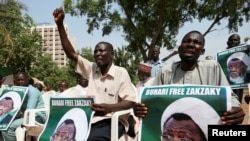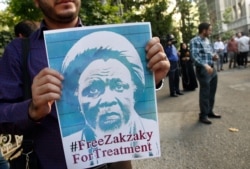James Butty contributed to this report.
WASHINGTON - Controversial cleric Sheikh Ibrahim El-Zakzaky returned home to Nigeria after a brief trip to India, where he had sought medical treatment after four years in detention.
The news came as a surprise to supporters who had celebrated his departure earlier in the week. Nigerian authorities had granted Zakzaky medical leave while he awaits trial. He was charged with inciting violence and other offenses but denies guilt. While in detention, he has had two strokes and is losing his sight, the BBC reported.
In a videotaped statement posted on Twitter, the 66-year-old Shia cleric said he had been informed by Indian regional authorities that he was being returned to Abuja, Nigeria. "We hope this is the best decision for us," he said in a translated and subtitled statement.
Zakzaky is the leader of the Islamic Movement in Nigeria (IMN), a Shia Islamic group closely allied to Iran. Long distrusted by Nigerian authorities, Zakzaky was held as a prisoner for nine years in the 1980s and 1990s. In 2015, the Nigerian army clashed with his supporters, killing about 350 people.
Zakzaky and his wife were both wounded in the battle, and he has been detained since. His supporters have demanded his release with periodic protests, which security forces have violently suppressed.
John Campbell, a senior fellow for Africa policy studies at the Council on Foreign Relations, said Zakzaky may have not liked the strict terms of his trip. Zakaky wished to be checked into a hotel upon arrival in India, Campbell said, but instead was taken directly to a hospital and surrounded by security personnel, restricting his ability to move freely in the country.
"Apparently, what he had wanted to do in India was to resume, essentially, his political activity," Campbell said. "And so he anticipated being unfettered and found himself to be very fettered, indeed, and that, I think, is at the heart of his discontent."
Online, Zakzaky's supporters claimed authorities had forced him to return to Nigeria for political reasons.
In an email response to VOA, the Indian Embassy in Nigeria highlighted social media posts in which the diplomatic mission refuted claims the Indian and Nigerian governments were working to keep Zakzaky unlawfully detained or deny him treatment.
Estimates of the number of IMN followers range from several hundred thousand to 3 million, Campbell said. He added that one concern is that Zakzaky's followers will become disaffected with the political process and take up arms. The worst-case scenario would be that they become an insurgency, similar to the radical Islamist group Boko Haram.
"The concern is that, if the Shia are radicalized, that that is not going to be good," Campbell said. "Now there's a difference. Zakzaky has never advocated violence, whereas Boko Haram preachers have. So that's a fairly important point. On the other hand, the concern has to be: What happens if the Shia, in fact, start advocating violence?"
The group had been holding daily protests in the streets of Abuja, but in an interview with VOA's Daybreak Africa on Monday, Ibrahim Gamawa, a spokesperson for the IMN, said those protests would stop while Zakzaky receives treatment.
He said the group is happy, but added that the medical leave should have been granted long ago.
"We will disappear from the streets of Abuja for the time being. We pray that our sheikh will come back healthier than when he left the country," Gamawa said.
Gamawa denied that the group has ever used violence, saying they are victims of violence by Nigerian authorities. "We want to unite Nigerians. We want Nigerians to understand each other. We want Nigerians to tolerate each other. We want Nigerians to be each other's people. So, extremism is for the extremists," he told VOA.
"There is no civil court that convicted any of our members of killing any other person," Gamawa added. "We are victims of all these things that come from disgruntled people, so we are victims of extremism. We are victims of political struggle. We are an endangered species in Nigeria."









